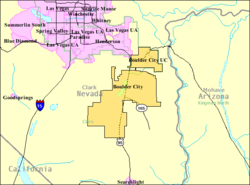Boulder City
| Boulder City, Nevada | |
|---|---|
| City | |
![Boulder Dam Hotel built in 1933[1]](http://upload.wikimedia.org/wikipedia/commons/thumb/9/9e/Boulder-hotel.jpg/250px-Boulder-hotel.jpg)
Boulder Dam Hotel built in 1933
|
|
| Nickname(s): Home of Hoover Dam | |
 Location of Boulder City in Clark County, Nevada |
|
 U.S. Census map |
|
| Location in the United States | |
| Coordinates: 35°58′43″N 114°49′57″W / 35.97861°N 114.83250°WCoordinates: 35°58′43″N 114°49′57″W / 35.97861°N 114.83250°W | |
| Country | United States |
| State | Nevada |
| Government | |
| • Mayor | Rodney S. Woodbury (2015–2019) |
| • Councilman | Cam Walker (2013–2017) |
| • Councilman | Rich Shuman (2015–2019) |
| • Councilman | Duncan McCoy (2013–2017) |
| • Councilwoman | Peggy Leavitt (2015-2019) |
| Area | |
| • Total | 208.56 sq mi (540.16 km2) |
| • Land | 208.53 sq mi (540.08 km2) |
| • Water | 0.03 sq mi (0.08 km2) |
| Elevation | 2,510 ft (765 m) |
| Population (2010) | |
| • Total | 15,023 |
| • Density | 72/sq mi (27.8/km2) |
| Time zone | PST (UTC-8) |
| • Summer (DST) | PDT (UTC-7) |
| ZIP codes | 89005–89006 |
| Area code(s) | 702/725 |
| FIPS code | 32-06500 |
| GNIS feature ID | 858617 |
| Website | www |
Boulder City is a city in Clark County, Nevada. It is approximately 26 miles (42 km) southeast of Las Vegas. As of the 2010 census, the population of Boulder City was 15,023.
Boulder City is one of only two cities in Nevada that prohibits gambling (the other being Panaca).
The land upon which Boulder City was founded was a harsh, desert environment. Its sole reason for existence was the need to house workers contracted to build the Hoover Dam on the Colorado River (known commonly as Boulder Dam from 1933 to 1947, when it was officially renamed Hoover Dam by a joint resolution of Congress). Men hoping for work on the dam project had begun settling along the river in tents soon after the precise site for the dam had been chosen by the Bureau of Reclamation in 1930. Their ramshackle edifices were collectively known as "Ragtown".
Boulder City was originally built in 1931 by the Bureau of Reclamation and Six Companies, Inc. as housing for workers who were building the Hoover Dam.
The sheer scale of the dam and duration of the project required the Bureau of Reclamation to consider the construction of a semi-permanent town rather than a temporary arrangement. Boulder City was exceptionally rare as an example of a town fully planned under government supervision. This is unlike 19th century privately funded company town examples found in the United Kingdom, such as Port Sunlight, or in the United States, such as Pullman, Chicago.
Boulder City was carefully planned through federal supervision as a model community, with Dutch-born urban architect Saco Rienk de Boer contracted to plan it. DeBoer had been a planner for Denver, Colorado, and was to design many towns and suburbs around the Rocky Mountain region. Because the Hoover Dam project itself represented a focus for optimism for a country suffering from the effects of the Great Depression, the town itself was to be an additional manifestation of this optimism. There was to be an emphasis on a clean-living environment for dam workers. The plan submitted by DeBoer in 1930 was formal and symmetrical with a park and the Bureau of Reclamation building at the termination of the two main axes. The plan was deemed too expensive to carry out in its original form and was modified to allow for more regular block sizes. Nevertheless, its allowance for public space and copious amounts of landscaping earned it the moniker "Nevada's Garden City". The provision of green landscape was another expression of the Bureau of Reclamation's "mission to reclaim and 'green' the American West."
...
Wikipedia

